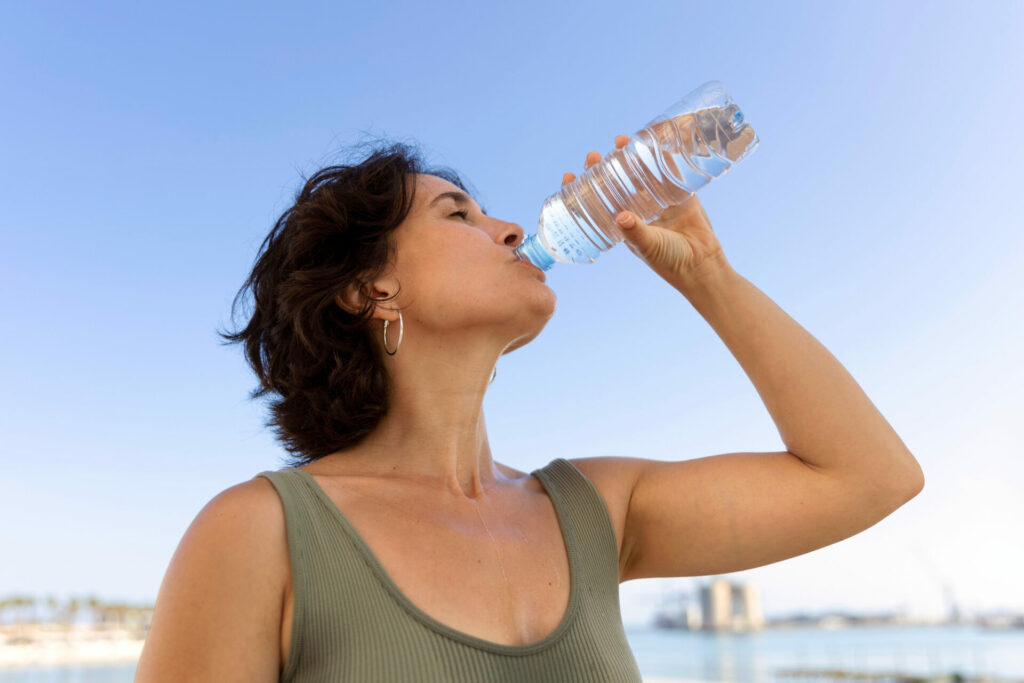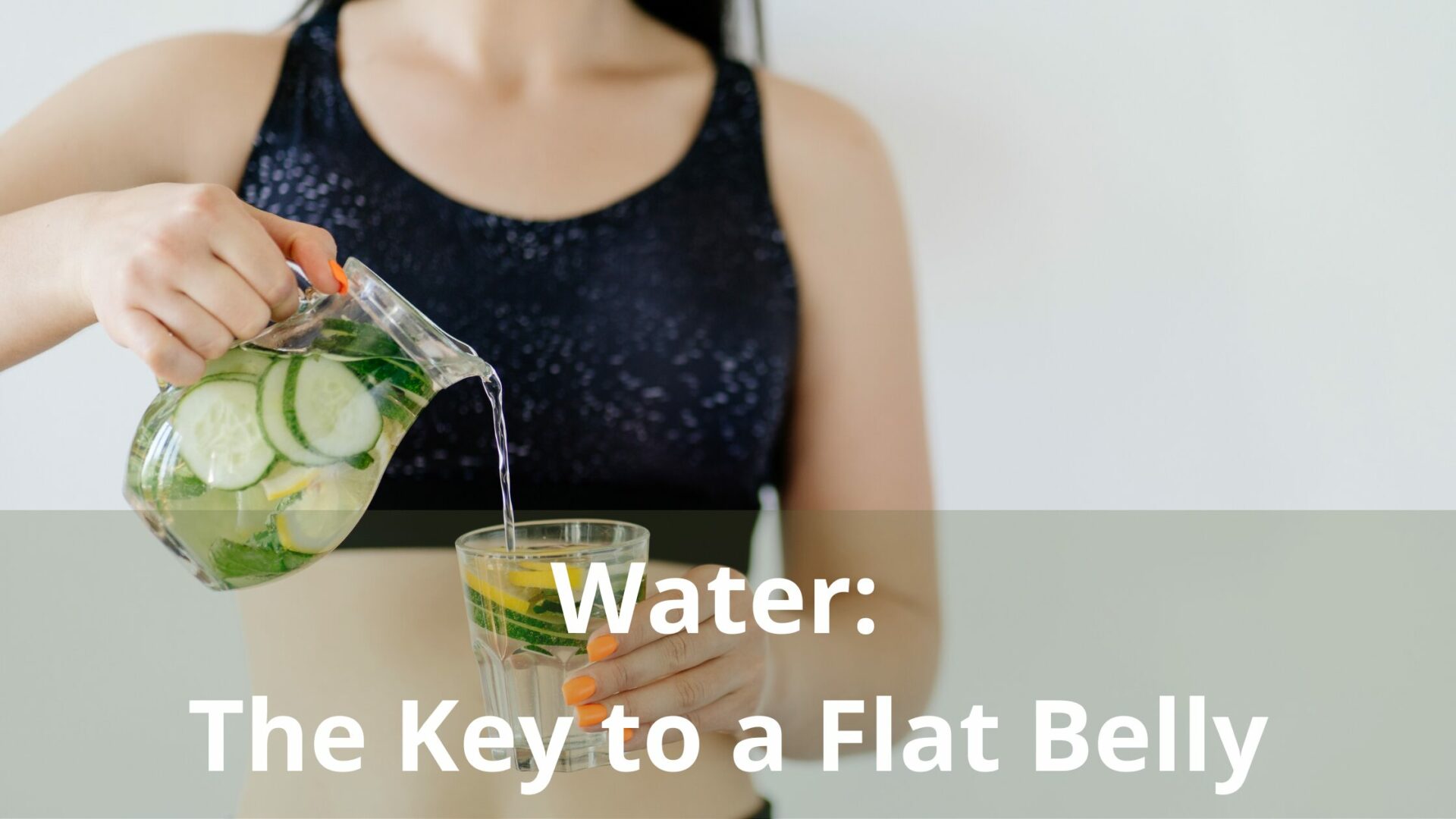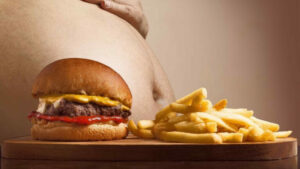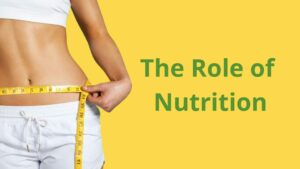Hydration is key for many factors involved in weight loss, including digestion and muscle function. To stay hydrated, females need around 9 cups of water per day and males need around 13 cups. Drinking adequate water may help people lose weight. Researchers are still unsure why drinking more water helps a person to lose weight, but many studies show some positive correlation between increased water consumption and weight loss. This article outlines six reasons that drinking water may help a person lose weight. It also looks at how much water a person should drink each day.
Table of Contents
Water as a Natural Appetite Suppressant
When the stomach signals fullness to the brain, it triggers a cessation of eating. Water, by occupying space in the stomach, induces a sensation of fullness, diminishing hunger.

Sometimes, the body may misinterpret thirst as hunger. Combatting this, a simple remedy is to consume a glass of water before resorting to snacks, effectively curbing unnecessary eating.
In a 2014 study involving 50 overweight females, each drinking 500 milliliters of water 30 minutes before meals for eight consecutive weeks, participants witnessed a decrease in body weight, body fat, and body mass index (BMI). Notably, they reported experiencing appetite suppression.
Water’s Role in Increasing Calorie-Burning
Emerging research underscores the potential role of water consumption in calorie burning. In a noteworthy 2014 study, a group of 12 individuals who consumed 500 mL of both cold and room temperature water exhibited a notable increase in energy expenditure. The participants burned approximately 2–3% more calories than their baseline in the 90 minutes following water intake.
Beyond immediate effects, water might have a more sustained impact on the body’s energy dynamics. It is suggested that water could temporarily elevate the body’s resting energy expenditure, influencing the number of calories burned while at rest. The intriguing aspect lies in the prospect of water not merely serving as a passive hydrating agent but actively contributing to the body’s metabolic processes.
Delving deeper into the temperature aspect, there is evidence that drinking cold water could potentially amplify the calorie-burning benefits associated with water intake. This phenomenon arises from the body’s expenditure of energy, or calories, as it works to heat up the cold water during the process of digestion. In essence, the body’s effort to reach an optimal temperature for water assimilation creates an additional calorie-burning mechanism, adding a nuanced layer to the potential impact of water on metabolism.
These findings illuminate a multifaceted relationship between water consumption and calorie burning, suggesting that the effects extend beyond mere hydration. As research in this field continues to evolve, it becomes increasingly clear that understanding the intricate interplay between water intake, temperature, and metabolic processes could unveil novel insights into strategies for managing calorie balance and promoting overall well-being.
How Water Aids in Body Waste Removal
Proper hydration plays a pivotal role in the effective elimination of waste from the body. In a state of dehydration, the body’s ability to expel waste through urine or feces is compromised.
Water serves as a vital ally to the kidneys in their filtration process, ensuring the removal of toxins and waste while preserving essential nutrients and electrolytes. However, when the body is dehydrated, the kidneys adjust by retaining fluid, hindering their efficiency in waste elimination.
The consequences of dehydration extend beyond the urinary system, affecting bowel movements as well. Dehydration can lead to the formation of hard or lumpy stools, contributing to issues like constipation. Water, acting as a natural lubricant, aids in maintaining the fluidity of waste, preventing the discomfort associated with hardened stools.
Beyond its impact on urinary and digestive functions, water plays a crucial role in the recovery from various digestive problems. It helps alleviate symptoms of diarrhea and indigestion, contributing to the restoration of the body’s equilibrium.
Accumulation of waste within the body can lead to undesirable consequences, such as bloating, swelling, and fatigue. Bloating, in particular, can give the illusion of added inches to one’s waistline, causing discomfort and affecting overall well-being.
Staying adequately hydrated emerges as a proactive strategy to prevent the retention of waste, offering a simple yet effective means to avoid carrying those few extra pounds associated with the accumulation of bodily waste. The importance of water in these physiological processes underscores its significance not just in quenching thirst but in maintaining the intricate balance necessary for optimal bodily functions.
Water Intake for Curbing Liquid Calorie Consumption
Accumulating liquid calories from sugary beverages like soda, juice, and sweetened coffee or tea is a common yet often overlooked factor in weight management. The impact of calories consumed in sports drinks or alcoholic beverages is also frequently underestimated.
The potential for substantial, long-term weight loss lies in making simple yet impactful changes, such as substituting high-calorie drinks with water or other no-calorie alternatives like herbal tea. This shift not only aids in calorie reduction but also establishes a healthier beverage consumption pattern.
In a noteworthy 2015 study, female participants incorporated a daily ritual of drinking 250 mL of water after lunch during a 24-week weight loss program. Astonishingly, they achieved a weight loss of 13.6% more than their counterparts in the program who consumed an equivalent volume of diet beverages after lunch. This suggests that a seemingly minor adjustment, like choosing water over high-calorie alternatives, can yield significant and positive outcomes in the context of weight management.
Supporting this notion, a study involving 15,765 adults without obesity at the study’s onset revealed promising results. Participants who replaced just one sugar-sweetened beverage or beer per day with water demonstrated a higher incidence of weight loss and a reduced likelihood of obesity over a span of 4 years, as indicated by mathematical models.
These findings underscore the transformative potential of reevaluating beverage choices in the pursuit of weight loss and overall well-being. By fostering a habit of opting for water or other non-caloric alternatives, individuals can effortlessly navigate away from liquid calorie pitfalls and, in turn, contribute to their broader health and fitness goals.
Hydration Ignites Fat-Burning
Water is indispensable for the body’s efficient metabolism of stored fat and carbohydrates. The intricate process through which fat is metabolized is known as lipolysis. This intricate mechanism commences with hydrolysis, where water molecules play a pivotal role in interacting with triglycerides, the primary components of fats. This interaction results in the formation of glycerol and fatty acids, crucial elements in the energy release process.
Sufficient water intake is paramount for the body’s ability to break down not only the fats derived from food and beverages but also those stored within the body. The importance of water in this context extends beyond mere hydration; it becomes a fundamental catalyst in the metabolic processes that facilitate the utilization of fat stores for energy.
Supporting this notion, a mini-review conducted in 2016 revealed compelling evidence in animal studies. The research indicated that an increase in water intake was associated with heightened lipolysis, the breakdown of fats, leading to a subsequent loss of fat. This insight reinforces the link between adequate water consumption and the body’s ability to effectively engage in the fat-burning process.
In essence, the presence of water is not only crucial for overall bodily functions but specifically pivotal in the intricate dance of lipolysis. It highlights the intricate interplay between hydration and metabolic pathways, emphasizing the role of water not just as a quencher of thirst but as a fundamental element in the body’s capacity to utilize and burn stored fats for energy.
Hydration Enhances Exercise Performance
Exercise is a pivotal element in any weight loss regimen, and a key ally in this pursuit is often overlooked – water. The significance of water extends far beyond mere hydration; it plays a critical role in ensuring the smooth functioning of muscles, connective tissues, and joints during physical activity. As the body gears up for exercise, water aids organs like the lungs and heart in working efficiently, promoting overall performance.
Hydration emerges as a preventative measure against potential hindrances to a productive workout. Adequate water intake significantly reduces the risk of issues such as muscle cramps and fatigue, which could impede exercise intensity and duration. The seamless coordination of muscles, tissues, and organs facilitated by proper hydration contributes to a more effective and rewarding workout experience.
To optimize exercise outcomes, it is crucial to prioritize consistent water intake throughout the entire exercise routine. Consuming water before, during, and after physical activity is essential to prevent dehydration, ensuring that the body remains adequately fueled and primed for optimal performance. This practice not only sustains endurance but also aids in post-exercise recovery.
The importance of keeping water readily accessible cannot be overstated, particularly when engaging in exercise under challenging environmental conditions. Whether it’s the heat, humidity, or intense sunlight, these factors can escalate the body’s hydration needs. Having water close at hand becomes a strategic imperative to counteract potential dehydration, supporting the body’s resilience in adverse weather conditions.
Integrating water consumption into your exercise routine is not just a matter of staying hydrated; it’s a fundamental strategy for elevating the quality and effectiveness of your workouts. Recognizing the symbiotic relationship between water and exercise underscores the holistic approach required for a successful weight loss journey, where every sip contributes to the overall vitality and efficiency of your fitness endeavors.
What’s Your Hydration Quotient?
Determining the optimal water intake is a nuanced process with no one-size-fits-all recommendation. The amount of water a person needs can vary based on a multitude of factors, each intricately intertwined with individual requirements. Key determinants include activity level, age, body size, ambient temperature, humidity, sun exposure, and overall health status. To navigate this complexity, the Academy of Nutrition and Dietetics offers estimations for the daily total water intake, acknowledging that approximately 20% of this requirement is typically obtained from food sources.
It’s essential to highlight that not all beverages contribute equally to hydration. Some beverages may even have a dehydrating effect and should not be included in the daily fluid intake calculation. Examples of such potentially dehydrating beverages include those that are sugar-sweetened and alcoholic. It’s crucial for individuals to be mindful of their beverage choices and ensure that their daily fluid intake aligns with their overall hydration needs.
Understanding the variables influencing water requirements and considering both the combined and isolated contributions from food and beverages provides a more comprehensive approach to maintaining optimal hydration levels tailored to individual circumstances.
Simple Ways to Boost Your Water Intake
Incorporating these practical tips into your daily routine can significantly boost your water intake and contribute to overall hydration:
- Mealtime Hydration: Make it a habit to consume at least one 8-ounce glass of water with each meal. This not only complements your dining experience but also ensures a steady intake throughout the day.
- Portable Hydration: Carry a reusable water bottle wherever you go. Having water readily available encourages regular sips, making it convenient to stay hydrated whether you’re at work, running errands, or engaged in recreational activities.
- Exercise Hydration: Increase your water intake during exercise or physical activity. Replenishing fluids lost through sweat is crucial for maintaining performance and preventing dehydration.
- Weather-Responsive Hydration: Adjust your water intake based on environmental conditions. Drink extra water on warm, humid, or sunny days to counter increased perspiration and keep your body adequately hydrated.
- Bedside Hydration: Keep a glass of water within easy reach near your bed. This simple practice encourages a sip before bedtime or upon waking, contributing to hydration at the start and end of your day.
- Liquid-Rich Meals: Incorporate soups and liquid-rich dishes into your diet, such as curries, stews, and smoothies. These not only offer a delicious variety but also contribute to your overall fluid intake.
- Water-Packed Produce: Opt for fruits and vegetables with high water content. Berries, grapes, melons, tomatoes, celery, cucumbers, and lettuce are excellent choices. Snacking on these hydrating foods adds a nutritional dimension to your water intake.
- Natural Supplements for Hydration: Consider incorporating natural supplements that enhance hydration. Electrolyte-rich options, such as coconut water or water infused with a hint of natural flavors like cucumber or mint, can make your hydration routine more enticing. These alternatives not only contribute to your fluid intake but also provide additional nutrients, enriching your overall hydration experience.
By adopting these strategies, you can create a holistic approach to hydration, making it easier to meet your daily water needs and enjoy the associated health benefits. Remember, staying hydrated is a simple yet powerful investment in your overall well-being.
Frequently Asked Questions (FAQs) on Hydration:
Q1: How much water should I drink daily? A1: The general guideline is to aim for at least eight 8-ounce glasses of water per day, known as the “8×8 rule.” However, individual water needs can vary based on factors like age, weight, activity level, and climate.
Q2: Can I rely on beverages other than water for hydration? A2: While water is the best choice for hydration, other beverages like herbal teas, infused water, and even certain foods with high water content contribute to overall fluid intake. However, be mindful of sugary and caffeinated drinks, as they may have different effects on hydration.
Q3: Is it possible to drink too much water? A3: Yes, it’s possible to overhydrate, a condition known as hyponatremia. This occurs when the balance of electrolytes in your body is disrupted. It’s important to find a balance and not force excessive water consumption beyond your body’s needs.
Q4: How can I remember to drink more water throughout the day? A4: Set reminders on your phone, use a water-tracking app, or associate water consumption with daily routines, such as drinking a glass before meals. Carrying a reusable water bottle also serves as a visual cue to stay hydrated.
Q5: Does the temperature of the water matter? A5: The temperature preference varies from person to person. Some prefer cold water, while others like it at room temperature. The key is to choose a temperature that encourages you to drink more.
Q6: Are there natural supplements I can add to my water for better hydration? A6: Absolutely. Consider natural supplements like coconut water or infusing your water with fruits, vegetables, or herbs for added flavor and nutritional benefits. Just be cautious of added sugars or artificial additives.
Q7: Can I count caffeinated beverages towards my daily water intake? A7: Caffeinated beverages like coffee and tea do contribute to overall fluid intake, but excessive caffeine consumption can have diuretic effects. It’s advisable to balance caffeinated drinks with plain water.
Q8: Does age affect hydration needs? A8: Yes, age can influence hydration needs. As we age, our sense of thirst may diminish, making it crucial for older adults to consciously monitor their water intake to prevent dehydration.
Q9: Are there specific foods that can help with hydration? A9: Yes, fruits and vegetables with high water content, such as watermelon, cucumber, and celery, contribute to hydration. Soups and liquid-rich meals also provide a source of fluids.
Q10: How can I tell if I’m adequately hydrated? A10: Pay attention to the color of your urine – a pale yellow color usually indicates good hydration. Additionally, signs like thirst, clear skin, and overall well-being are positive indicators of proper hydration.
Conclusion
Prioritizing adequate hydration is a fundamental aspect of maintaining overall well-being. The tips provided, ranging from incorporating water into daily meals to choosing natural supplements for added variety, offer a holistic approach to meeting your hydration needs. Understanding the importance of temperature preferences, monitoring caffeine intake, and recognizing age-related influences on hydration allows for a more informed and personalized approach.
Staying hydrated is not just about fulfilling a daily quota but rather embracing a lifestyle that promotes health and vitality. Whether through mindful water consumption, liquid-rich foods, or occasional natural supplements, the journey to optimal hydration is both accessible and rewarding. By addressing common questions and concerns, we hope this guide empowers you to make informed choices that align with your unique preferences and circumstances.
Remember, the benefits of proper hydration extend beyond quenching thirst; they encompass improved digestion, enhanced energy levels, and support for various bodily functions. As you embark on your hydration journey, listen to your body’s signals, adopt practical strategies, and celebrate the positive impact that a well-hydrated lifestyle can have on your overall health and quality of life.





